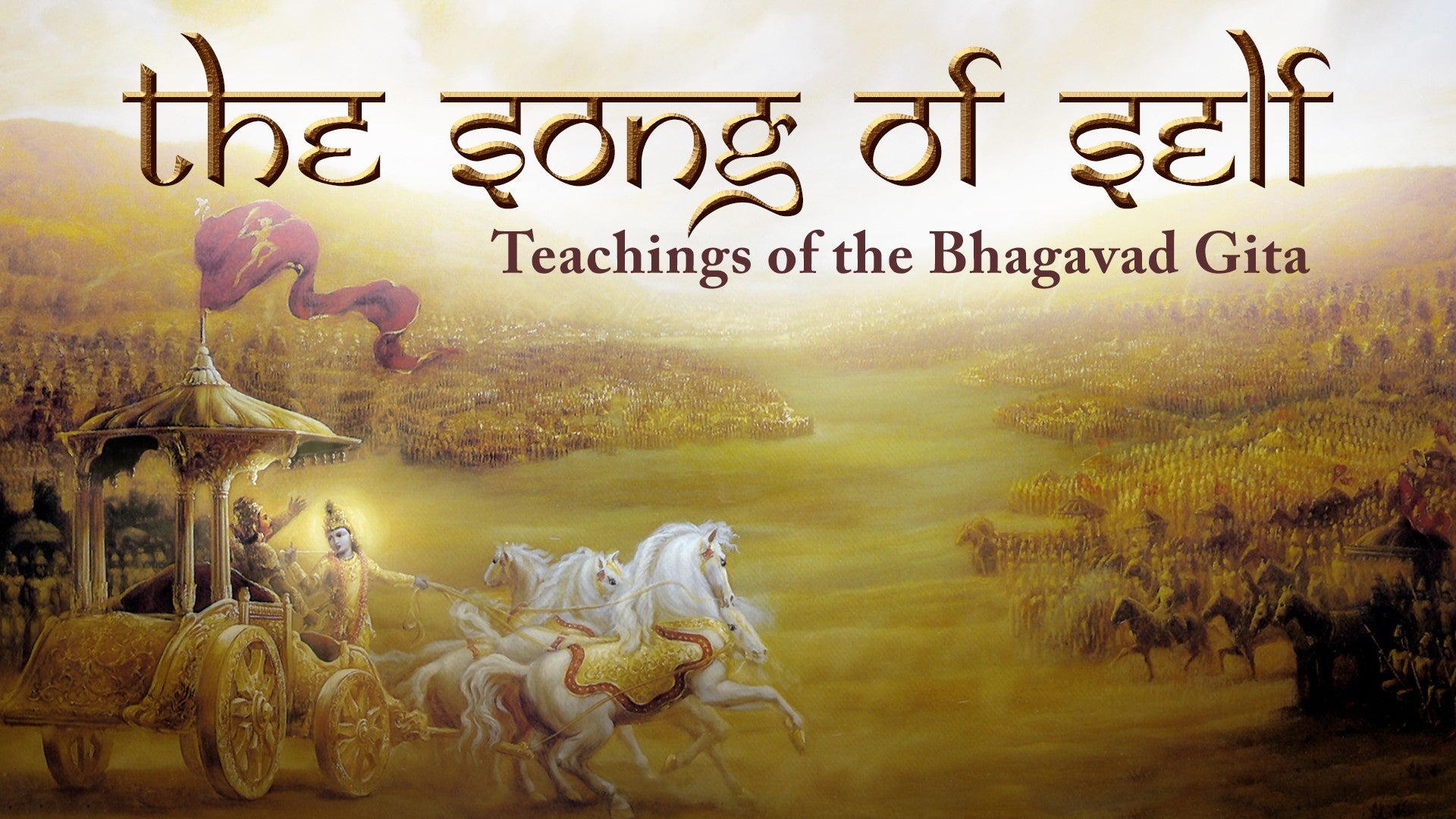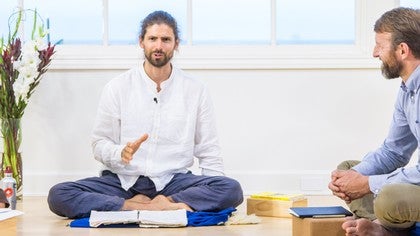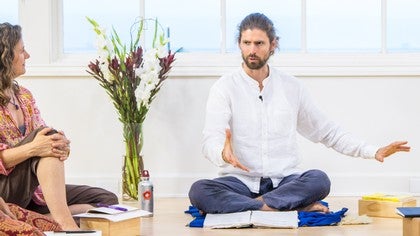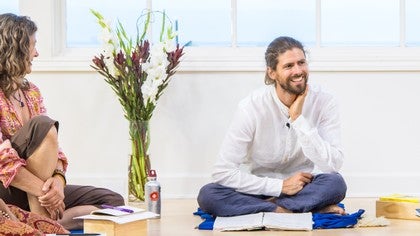Description
About This Video
Transcript
Read Full Transcript
So, having told Arjuna that he's really got no cause to worry or mourn or be upset, Krishna now in the next couple of verses takes it a bit further and says, actually Arjuna, this is your lucky day. So here you are, you feel like it's terrible, but actually this is what you've been waiting for your whole life. So let's have a look at these two very beautiful and very practical verses, 31 and 32. So, Krishna says, and knowing your own dharma, knowing your own kind of, we'll talk more about what that means in a moment, knowing your own dharma, you have no cause to tremble, you have no cause to shake, no cause to feel this perturbation. You are a warrior, you are a kshatriya, one whose duty it is to protect the well-being of the whole kingdom. For a warrior, what is better than to stand up and fight for the well-being of the whole? That's the opportunity you're facing now, what could be better than that? And he goes on, this opportunity has come to you as if by chance, but this is really a great boon because it is an open door to heaven. He says, sukinaha kshatriya av parta, lavante yudhamid rishami, he says, lucky are those kshatriyas, those warriors who get the opportunity to engage in this type of fight, to fight and stand up for the well-being of the whole. He says, this is just an amazing opportunity for you, this is what you've been working for your whole life long. Let's look a little bit more closely at these verses now. Sva dharma mapicha bhiksha navikampitamahrasi, from the point of view of your own dharma, you have no cause to tremble. Now we mentioned already the word dharma, and it's a word that can reach in many directions, but its root is dr, which means to support or sustain. And often if you get a translation of the Bhagavad Gita, it will translate this as saying, from the point of view of your own duty, the duties that are part of your profession or your situation in the society. So Arjuna being a great warrior, being a leader of men, has the idea that it's his duty to protect the whole. So Krishna is saying, that's your job. Doing your job, you should be happy. Now you've got the chance to do your job at the top level, and really put your warrior skills to the test. Now, you might think, okay well Arjuna, yeah it's true in the Mahabharata, he's a warrior. And that might be his duty to get up and fight, but what's that got to do with me? Sva dharma mapicha bhiksha navikampitamahrasi, remember Arjuna represents the human being who's seeking truth. He represents all of us. So when Krishna says you have no cause to tremble, knowing your own duty or your own dharma, he's speaking to each of us. And what is the sva dharma of the human being? So in the orthodox Indian system, it's the idea that different human beings have different particular duties. If, for example, you are a mother or a father, then you have particular duties that somebody who is not a parent does not have. Similarly, if you're in the office, for example, of the king, and you have a whole load of duties that many other people who aren't in such a position of authority don't even have to worry about. However, there is another type of sva dharma which is much deeper and is the same for all of us. And the idea in yoga is that when you are a human being, your ultimate duty is to be yourself. Now sometimes when people hear this, they say, that sounds rather new agey. Are you sure that's not a kind of new urge interpolation on top of the text? And actually, no. There's the idea in yoga that that's what it's all about. It's about unveiling who you really are. And what does more to unveil and bring to the surface our deep resources and what we're really made of than a challenge that puts to the test the skills that we've been developing over so many years but in the situation of greater challenge? And this is where Arjuna finds himself. And this is where we find ourselves any time that we're at that edge. We're in the junction point. All those things we've worked on up to now, we've got confident in them to a certain degree. And so we're ready to test them at the next level. And this is what's happening here. So Sva Dharma Picha Vyakshay is saying, human being, your ultimate duty is to discover who you are, is to realize your true self. This situation which is challenging you and forcing you to encounter and actually meet and get to know more of what you're truly made of is a wonderful opportunity. What could be better for somebody who wants to know him or herself than a situation which is inviting him or her to discover more of what he or she is really made of? And then he continues.
It's come to you as if by chance, but it's an open door to heaven. Now, so what does that mean? In the Indian traditions, the idea that if you are a warrior and you die in the battlefield, you're going to go to heaven. And there's also the idea if you're a warrior and you do stick to your duty of looking after the well-being of the whole. Similarly, even if you don't die in battle, you'll go to heaven. Okay, well and good. But what about us here and now? What happens if we really do align our action with our deep belonging? We might say that heaven is a place where we have no desires because all our desires are fulfilled. So how about if we lived our lives in such a way that each day was the expression of our deepest longing? Then all our desires would kind of be fulfilled. They would dissolve in living in that utmost authenticity. And so I think this is what Krishna is inviting Arjuna to here. He said, you have the opportunity to do what you've been preparing for. It feels difficult because it's going to involve bringing parts of you into harmony that previously perhaps you've denied or you've left out a little that you've pushed to one side. So if, for example, in life we are asking for peace, we say, oh, I'd like to live in peace. We're basically asking, in most cases, or certainly in many cases, for some turmoil and some conflict. Now that might sound like a contradiction, but let me explain. If we want to live in peace, then we have to understand and come to terms with and harmonize those tendencies within us which would bar us experiencing peace, which would get in the way of us being in a truly peaceful state. So when we ask for peace, we're actually asking for the challenge that will bring to the surface those habits, those tendencies, those ways of thinking and seeing that are resident, perhaps within our psyche, that would get in the way of true peacefulness in our life. And Krishna's telling Arjuna, this is what you're faced with now. You've got a great opportunity to iron out some of those destabilizing, deharmonizing tendencies that are actually keeping you from your deep longing. So before we go on, there's a couple more things I'd like to mention about this verse. And of course we have the context of Krishna speaking to Arjuna as a warrior. And he says, lucky are those warriors who meet with this type of opportunity to stand up for justice, to stand up for that which is really going to be Shreya for the good of the whole. But I think we can also read into this verse a kind of broader reaching teaching that lucky are those people who see the opportunity and adversity. Because when we're a human being, sometimes we will be challenged. When things don't go the way we might have picked from the menu if we could, it's easy to get downcast. But Krishna's reminding us, who is happy in life? Basically, those whose attitude is conducive to happiness, those who are happy with what they have, with what they encounter. So you can see in the world, some people have an awful lot of things, some people have very few things. You can meet people who have a lot and they're very happy. Other people who have a lot, not happy at all. You meet some people who have very little and they're very happy. Others who have very little, not happy at all. So happiness isn't really about what we have or what type of situation we face. We all face so many different types of situation in the course of our lives. But Krishna's reminding us here the lucky ones are those whose attitude is conducive to happiness. Those who see that in the middle of adversity, there is opportunity.
The Song of Self: Bhagavad Gita: Chapter 2
Comments
You need to be a subscriber to post a comment.
Please Log In or Create an Account to start your free trial.











